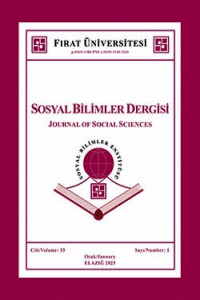Öz
The works titled Empire and Multitude that were co-authored by political theorists Michael Hardt and Antonio Negri have created a considerable impact on human and social sciences. In these studies, the writers examine the main characteristics of the passage from modernity to postmodernity, industrial production to postindustrial immaterial production, modern notion of sovereignty to the global regime that they call Empire. Moreover, they maintain that the political agents that were active in modernity should be reconsidered within the context of a new postmodern political subjectivity which they call “the multitude.” This article argues that Hardt and Negri’s political theory cannot be grasped only with an empirical approach, it must also be read from the perspective of political ontology. Underlying this claim is the fact that Hardt and Negri depart from the dominant political theories and critical methods of modernity, and that they take Gilles Deleuze and Félix Guattari’s Spinozian ontology to the center of their analysis. Accordingly, this article discusses the sources—primarily the philosophy of Deleuze and Guattari—that feed into concepts such as Empire, the multitude, desire, and immaterial labor introduced by Hardt and Negri, and it investigates the political ontology that constitutes the framework of their work.
Anahtar Kelimeler
Empire the multitude political ontology Michael Hardt Antonio Negri
Kaynakça
- Boundas, C. (1993). The Deleuze Reader. New York: Columbia University Press.
- Callinicos, A. (2007). In The Philosophy of Antonio Negri Vol. 2: Revolution in Theory (T. S. Murphy & A. K. Mustapha, Eds.). London, Ann Arbor: Pluto Press.
- Deleuze, G. & Guattari, F. (2000). Anti-Oedipus: Capitalism and Schizophrenia (R. Hurley et al., Trans.). Minneapolis: University of Minnesota Press.
- Haraway, D. (1999). A Cyborg Manifesto. In The Cultural Studies Reader (S. During, Ed.). London, New York: Routledge.
- Hardt, M. & Negri, A. (2000). Empire. Cambridge, Mass.: Harvard University Press.
- Hardt, M. & Negri, A. (2004). Multitude. New York: Penguin.
- Lazzarato, M. (1996). Immaterial Labor. In Radical Thought in Italy Vol.7 (P. Virno & M. Hardt, Eds.). Minneapolis, London: University of Minnesota Press.
- Lazzarato, M. (2003). Struggle, Event, Media (A. Derieg, Trans.). https://transversal.at/transversal/1003/lazzarato/en?hl=lazzarato. Last retrieved 18.06.2022.
- Lukacs, G. (1972). History and Class Consciousness (R. Livingstone, Trans.). Cambridge, Mass.: MIT Press.
- Marx, K. (1990). Capital Volume I (B. Fowkes, Trans.). London, New York: Penguin.
- Marx, K. (1992). Early Writings (R. Livingstone & G. Benton, Trans.). London, New York: Penguin.
- Marx, K. & Engels F. (1949). The Communist Manifesto (P. M. Sweezy & L. Huberman, Trans.). New York: Monthly Review Press.
- Negri, A. (2007). Art and Culture in the Age of Empire and the Time of the Multitudes (M. Henninger, Trans.). SubStance, 38(112), 47-55.
- Ricciardi, A. (2007). Immanent Miracles: From De Sica to Hardt and Negri. MLN, 122(5), 1138-1165.
Öz
Siyaset kuramcıları Michael Hardt ve Antonio Negri’nin birlikte kaleme aldıkları İmparatorluk ve Çokluk başlığını taşıyan eserler insan ve toplum bilimleri alanlarında hatırı sayılır bir etki yaratmıştır. Yazarlar bu çalışmalarında modernlikten postmodernliğe, sanayi üretiminden sanayi sonrası maddi olmayan üretime, modern egemenlik anlayışından İmparatorluk adını verdikleri küresel rejime geçişin temel özelliklerini ele almaktadır. Bunun yanında, modernlikte etkin olan siyasal faillerin postmodern durumda “çokluk” adını verdikleri yeni bir siyasal öznellik bağlamında tekrar değerlendirilmesi gerektiğini belirtmektedir. Bu makale Hardt ve Negri’nin siyaset kuramının sadece ampirik bir yaklaşımla kavranamayacağını, aynı zamanda siyaset ontolojisinin bakış açısıyla okunması gerektiğini öne sürmektedir. Bu iddianın temelinde Hardt ve Negri’nin modernliğe ait hâkim siyaset kuramlarından ve eleştiri yöntemlerinden ayrılarak Gilles Deleuze ve Félix Guattari’nin kullandığı Spinozacı ontolojiyi kendi çözümlemelerinin merkezine almaları yatmaktadır. Buna göre bu makalede Hardt ve Negri’nin ortaya attıkları İmparatorluk, çokluk, arzu ve maddi olmayan emek gibi kavramların başta Deleuze ve Guattari felsefesi olmak üzere hangi kaynaklardan beslendiği tartışılmakta, yazarların eserlerinin çerçevesini oluşturan siyasal ontoloji incelenmektedir.
Anahtar Kelimeler
İmparatorluk Çokluk siyasal ontoloji Michael Hardt Antonio Negri
Kaynakça
- Boundas, C. (1993). The Deleuze Reader. New York: Columbia University Press.
- Callinicos, A. (2007). In The Philosophy of Antonio Negri Vol. 2: Revolution in Theory (T. S. Murphy & A. K. Mustapha, Eds.). London, Ann Arbor: Pluto Press.
- Deleuze, G. & Guattari, F. (2000). Anti-Oedipus: Capitalism and Schizophrenia (R. Hurley et al., Trans.). Minneapolis: University of Minnesota Press.
- Haraway, D. (1999). A Cyborg Manifesto. In The Cultural Studies Reader (S. During, Ed.). London, New York: Routledge.
- Hardt, M. & Negri, A. (2000). Empire. Cambridge, Mass.: Harvard University Press.
- Hardt, M. & Negri, A. (2004). Multitude. New York: Penguin.
- Lazzarato, M. (1996). Immaterial Labor. In Radical Thought in Italy Vol.7 (P. Virno & M. Hardt, Eds.). Minneapolis, London: University of Minnesota Press.
- Lazzarato, M. (2003). Struggle, Event, Media (A. Derieg, Trans.). https://transversal.at/transversal/1003/lazzarato/en?hl=lazzarato. Last retrieved 18.06.2022.
- Lukacs, G. (1972). History and Class Consciousness (R. Livingstone, Trans.). Cambridge, Mass.: MIT Press.
- Marx, K. (1990). Capital Volume I (B. Fowkes, Trans.). London, New York: Penguin.
- Marx, K. (1992). Early Writings (R. Livingstone & G. Benton, Trans.). London, New York: Penguin.
- Marx, K. & Engels F. (1949). The Communist Manifesto (P. M. Sweezy & L. Huberman, Trans.). New York: Monthly Review Press.
- Negri, A. (2007). Art and Culture in the Age of Empire and the Time of the Multitudes (M. Henninger, Trans.). SubStance, 38(112), 47-55.
- Ricciardi, A. (2007). Immanent Miracles: From De Sica to Hardt and Negri. MLN, 122(5), 1138-1165.
Ayrıntılar
| Birincil Dil | İngilizce |
|---|---|
| Bölüm | Dil ve Edebiyat |
| Yazarlar | |
| Yayımlanma Tarihi | 19 Ocak 2023 |
| Gönderilme Tarihi | 22 Haziran 2022 |
| Yayımlandığı Sayı | Yıl 2023 Cilt: 33 Sayı: 1 |

